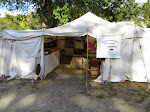The War of the Rebellion, The War of Northern Aggression, The Late Great Unpleasantness, The Civil War. No matter what you call it, (and there are many names), I believe that the Civil War was Americas greatest trial, its greatest tragedy and its greatest triumph. Brother against brother, father against son, and neighbor against neighbor no issues have been as divisive as secession and slavery before or since this time period. In communities across the nation violence erupted as pro-union and pro-confederate neighbors attacked each other using guerilla type methods. Even in the Senate, violence erupted as Senator Charles Sumner was beaten with a cane by Preston Brooks in the Senate chambers in 1856. No other president than Lincoln has had to face the division of the union. This issue, more than any other, caused Lincoln the most heartache. On June 16, 1858 Lincoln said, "A house divided against itself cannot stand. I believe this government cannot endure permanently half slave and half free. I do not expect the union to be dissolved--I do not expect the house to fall--but I do expect that it will cease to be divided. It will become all one thing, or all the other.” And on August 22, 1862, he said, “ My paramount object in this struggle is to save the Union, and is not either to save or destroy slavery. If I could save the Union without freeing any slave I would do it, and if I could save it by freeing all the slaves, I would do it; and if I could save it by freeing some and leaving others alone I would also do that.” 1 This division of the Union was a heavy weight resting on the shoulders of a big man not just in stature, but in character, as well. I believe this to be America’s biggest trial.
The Civil War was also America’s greatest tragedy. Over half a million soldiers (both North and South) perished in the service of their country. This is more than all other wars combined from the Revolution to Vietnam. In addition to soldiers, civilians were tortured and killed, homes and cities were vandalized and destroyed or burned, and lives were disrupted. Thousands of soldiers starved and rotted in prisoner of war camps, both north and south. The heartache was unfathomable. To put this into perspective, there were less than 3,000 people killed in the attacks on 9/11. Compare this to the Battle of Shiloh where there were over 23,000 casualties, or Antietam where there were over 26,000 casualties or Gettysburg where there were over 50,000 casualties.2 And these are only three of the many battles that were waged during the 4 year conflict. While I am in no way trying to minimize the 9/11 attacks, I am trying to create a mental image of the tragedy of this war. To add to this tragedy is the fact that it was not an outsider attacking a unified nation, but rather, Americans fighting Americans.
The Civil War changed many things. Most notable was the end of slavery in this country. Although it would be one hundred plus years for the black man to achieve true equality, they could now pursue that goal as free men. One can only imagine how it must have felt to pass from being someone’s chattel to having chains fall off, both literally and figuratively.
After the war, the South was left in shambles. It took many years of hard work to rebuild and restore the buildings and rail lines as well as the communities and people. Bitterness persisted, especially since many carpet baggers invaded the region to further exploit a people who were already down in order to pad their own pockets. In true American fashion, though, the South, like the Phoenix, arose out of the rubble and carried on as equals to their Northern counterparts. Today we are one nation. There is no more North and South. Before the Civil War, people would say, “The United States are…” Today, they say, “The United States is…” The ending of slavery and the re-unification of a nation demonstrates that the Civil War was truly America’s greatest triumph.
1 http://www.carrothers.com/lincoln.htm


No comments:
Post a Comment
Would love to hear your comments.